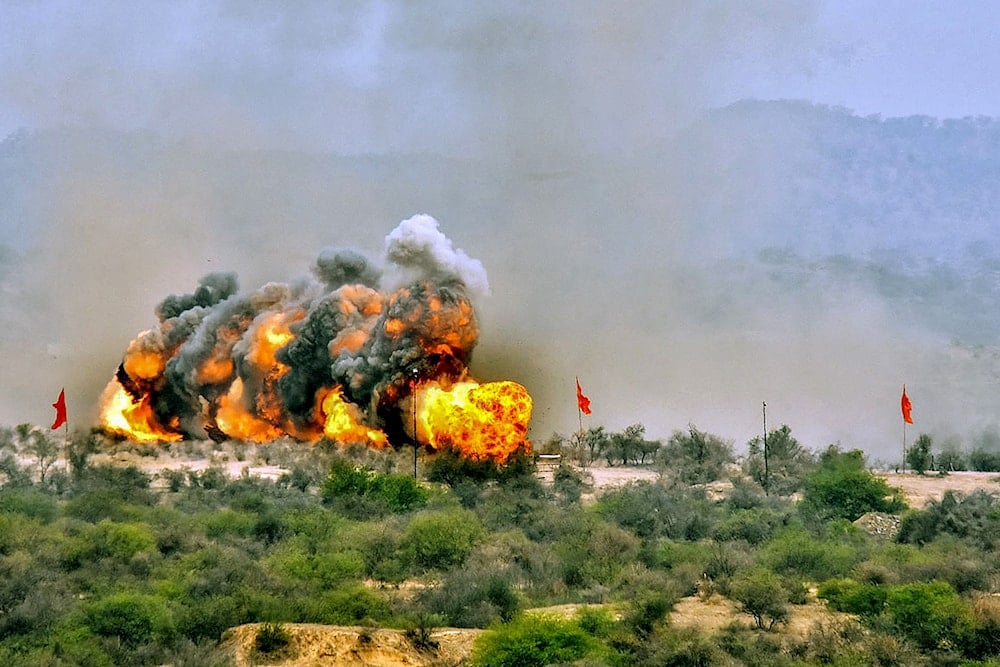Pakistan tests-fires another missile amid rising tensions with India
Pakistan test-fires a surface-to-surface missile during INDUS drills amid heightened tensions with India, as Iran steps in to mediate between the two nuclear-armed neighbors.
-

This handout photograph taken on May 1, 2025, and released by Pakistan's Inter Service Public Relation (ISPR) shows smoke pictured on the ground during the military exercise 'Hammer Strike', a high-intensity field training exercise conducted by the Pakistan Army’s Mangla Strike Corps at the Tilla Field Firing Ranges (TFFR) in Jhelum, Punjab province (ISPR/AFP)
Pakistan on Monday test-fired a surface-to-surface missile with a range of 120 kilometers as part of its ongoing INDUS military exercise, in a move highlighting growing Pakistan-India tensions following recent escalations in Kashmir.
According to a statement by the Inter-Services Public Relations (ISPR), the launch was conducted to ensure the “operational readiness of troops" and validate key technical parameters, including the missile’s advanced navigation system and enhanced accuracy.
The ISPR further confirmed that senior military leadership, including the Chairman Joint Chiefs of Staff Committee and the Chief of Army Staff, congratulated the troops, scientists, and engineers involved.
They also expressed "complete confidence in the operational preparedness and technical proficiency of Pakistan Army to thwart any aggression against the territorial integrity of Pakistan."
Pakistan's second missile test in three days
This was Pakistan’s second missile test in just three days. On Saturday, the army tested the Abdali missile system, a ballistic missile with a 450 km range.
Both tests were conducted amid concerns that India might initiate a military response following the Pahalgam attack, which killed 26 civilians in Indian-administered Kashmir.
Indian officials have not formally responded to Monday’s missile launch but had earlier termed such actions “reckless provocation”.
On Sunday, Pakistan’s government and military briefed representatives from all political parties, including Jailed former Prime Minister Imran Khan's PTI, which attended virtually, on the current state of relations with India.
According to Dawn, all parties voiced support for a strong national defense and a robust response to any Indian military "misadventure".
India’s Prime Minister Narendra Modi has given his armed forces “complete freedom” to respond, fueling fears of a possible confrontation.
Iran steps in as mediator between Pakistan and India
Amid the rising tensions, Iran’s Foreign Minister Abbas Araghchi arrived in Islamabad on Monday in a diplomatic bid to help ease friction between the two nuclear-armed neighbors.
Araghchi is scheduled to meet with Foreign Minister Ishaq Dar, President Asif Ali Zardari, and Prime Minister Shehbaz Sharif.
While Pakistan’s Foreign Ministry has not disclosed details, Information Minister Attaullah Tarar confirmed that “Pakistan is presenting its case to friendly countries.”
UNSC to discuss rising tensions in Kashmir at Pakistan's request
The latest developments come ahead of closed consultations by the UN Security Council on Monday to discuss rising tensions between India and Pakistan, following the latter's formal request for an emergency meeting, the Press Trust of India reported.
Pakistan, currently a non-permanent member of the 15-nation Security Council, requested the session, which was confirmed and scheduled by Greece, the Council's rotating president for May.
The Pahalgam attack has sharply escalated tensions between the nuclear-armed neighbors. India has accused Pakistan of backing cross-border terrorism and has vowed to bring those responsible to justice.
Islamabad, in turn, has denied any involvement in the Pahalgam attack, calling for an independent investigation and warning of potential retaliatory measures if aggression from India occurs.
Clashes along Line of Control continue
The de facto border Line of Control clashes have escalated since the Pahalgam attack, with Indian defense sources reporting nine consecutive nights of gunfire across the militarised de facto border.
Diplomatic relations between the two countries have deteriorated further, with tit-for-tat expulsions and the closure of several border crossings.
The latest escalation has drawn international concern. China has urged both sides to exercise “restraint", while the European Union has described the situation as “alarming".
In an interview for Fox News, US Vice President JD Vance called on India to act in a manner “that doesn't lead to a broader regional conflict.” He also pressed Pakistan to take action against militants allegedly operating from its territory.
The conflict in Kashmir, a Muslim-majority region claimed in full by both countries, remains at the heart of tensions. Rebels in Indian-administered Kashmir have waged an armed insurgency since 1989, demanding either independence or unification with Pakistan.
India continues to accuse Pakistan of backing the insurgents, an allegation that Islamabad denies. Pakistan says it supports the people of Kashmir in their right to self-determination and frequently condemns alleged human rights violations committed by Indian forces in the region.

 4 Min Read
4 Min Read








